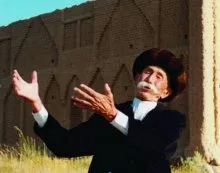
“The Kyrgyz epic is the largest in the world and we have much pride in it. It is called “Manas”. I’ve come to the conclusion that some storylines in Manas can be traced back to Bible plots. For example we have an epic hero Jakyb, whose name is actually the same with Hebrew Jacob, only with a different pronunciation. He had two wives like the Biblical Jacob, and it was his son’s name Manas that gave the name to our whole Kyrgyz epic. But this name “Manas” is nothing other than the Biblical Manasseh! As we remember from the Bible, Manasseh was Joseph’s son and therefore Jacob’s grandson, but was nevertheless blessed by Jacob on a par with his own sons. Thus the parallel with “Manas, son of Jakyb” becomes more than evident.
Now let us have a look at the cultural traditions and lifestyles. Both the ancient Hebrews and the Kyrgyz are nomadic peoples. We are both shepherds. When we cut meat from a lamb, we do it according to the same rules that we find in the Bible. Just like the Hebrews we cut it into 12 pieces. Just like the Hebrews we do not eat the sinew of the hip which is upon the hollow of the thigh. Just like the Hebrews we should not break any of the bones. All these customs are recognizable in the Biblical text. And it’s only when you speak about Christ that you are confronted with mistrust, “Oh, no, do not say anything, He is a Russian God…”.”
Here I’d like to add that the same reaction is typical for plenty of IBT projects. “Russian God” – that’s it! People do not approach the Bible with scholarly ideas, unless they are professional historians. They see it through their attitude to the people who made the Bible known to them. And when these people belong to another nation and culture, if historical contacts between the nations were complicated by wars and conquests, they start seeing the Bible itself as part of an alien culture, or even as an instrument of violence and domination. That is why it turns out that in different corners of the world for some people the Bible is “Western”, and for others it is “Russian”. In this case a strictly scientific approach itself may cause a wonderful breakthrough.

IBT Russia/CIS is a non-profit organization financed through contributions from individuals, sponsoring organizations and foundations.
You can donate to IBT:
Through: AO UniCredit Bank, Moscow
SWIFT: IMBKRUMM
In favour of: Institute for Bible Translation
Address: 119334, Russia, Moscow, Andreevskaya nab. 2
TIN (INN) 7736231521
9-digit Bank identification code in Russian banking system: 044525545
Account no. (IBAN):
634261 USD 4020 02 001 or 40703840700010142881
634261 EUR 4020 02 001 or 40703978700010366720
634261 GBP 4020 02 001 or 40703826600010366723
Through: NOSTRO ACCOUNTS OF AO UNICREDIT BANK, MOSCOW:
USD JPMORGAN CHASE BANK N.A., NEW YORK SWIFT CODE: CHASUS33
EUR UNICREDIT BANK AG (HYPOVEREINSBANK) , MUNICH SWIFT CODE: HYVEDEMM
EUR UNICREDIT BANK AUSTRIA AG, VIENNA SWIFT CODE: BKAUATWW
EUR UNICREDIT S.P.A., MILANO SWIFT CODE: UNCRITMM
GBP THE ROYAL BANK OF SCOTLAND PLC, LONDON SWIFT CODE: RBOSGB2L
Important! In the field "designation" write "CHARITY DONATION"
For more information address IBT
You may sign up to receive our Russia/CIS monthly English newsletter here
